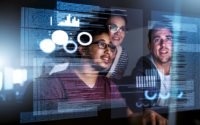
Manu Tukutuku, ma te huruhuru ka rere te manu – empowering learners to soar. Phase One; Opening the doorway for Māori to succeed in a digital community where cultural capacity and knowledge is valued and respected
This paper discusses Māori student achievement and how the first step to enable this is engaging the whānau and the student in situations where their mana and tuakiri remains intact. The paper identifies steps for culturally critical and sustaining practice when engaging whānau and students. It highlights some positive examples as well as reflecting on […]
















